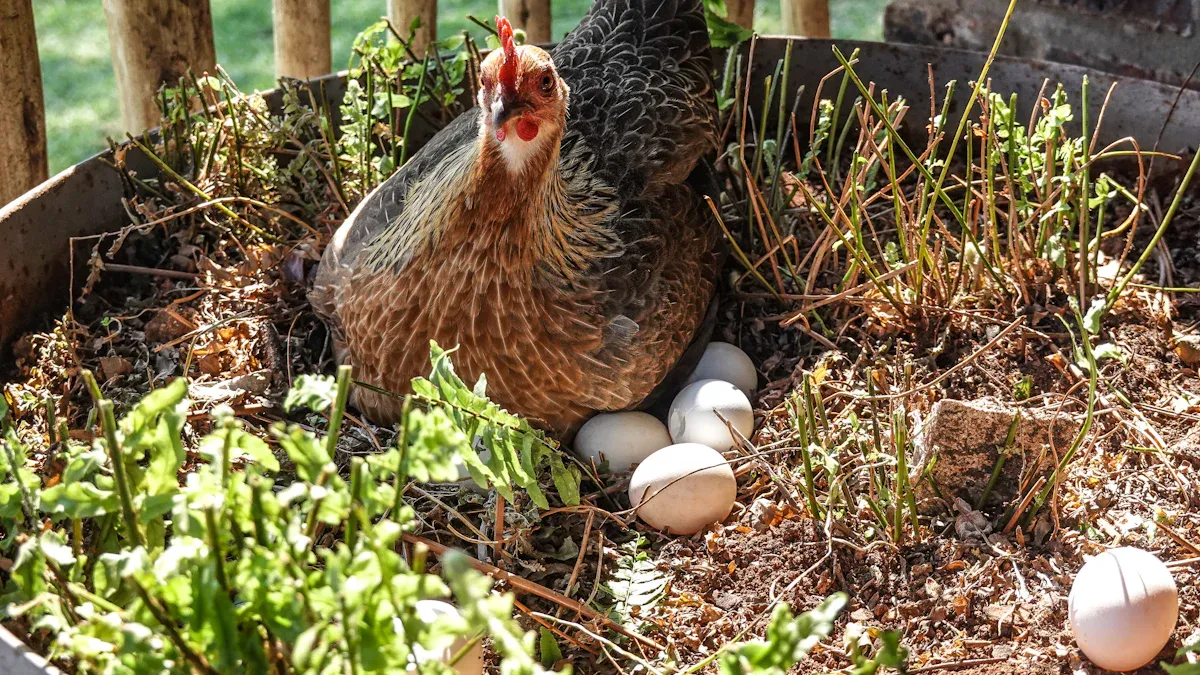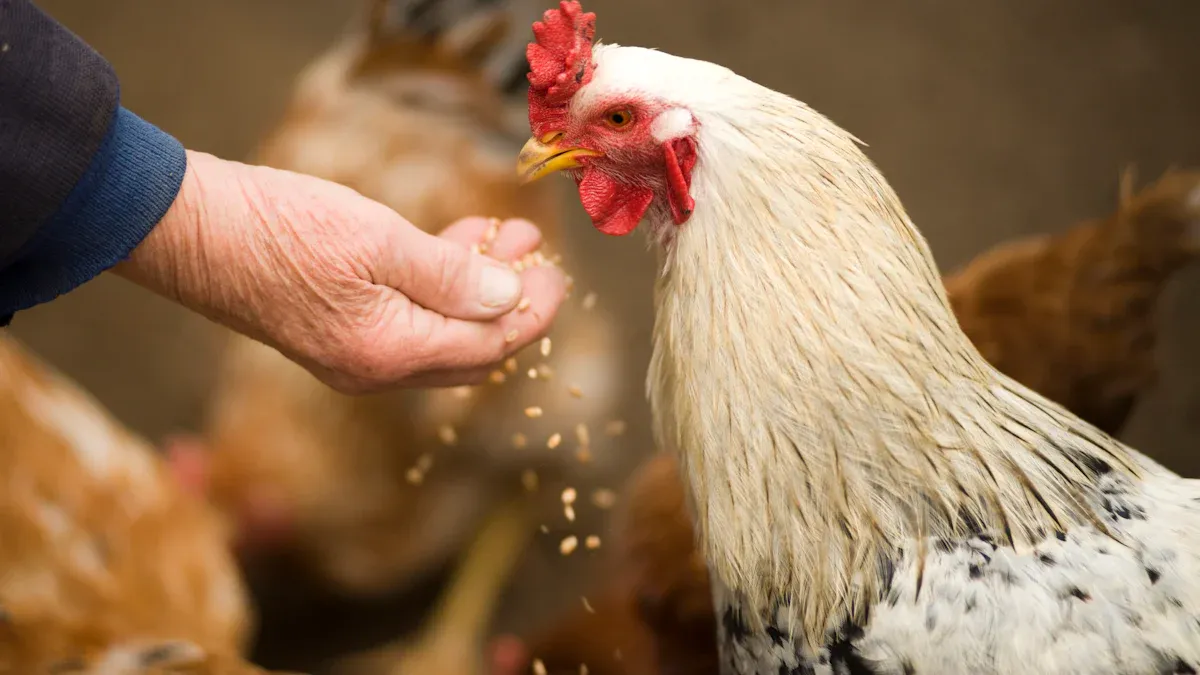
Mealworms in chicken feed give hens a natural boost. Studies show that adding insect meal helps hens lay eggs with stronger shells, richer yolks, and better nutrition. Chickens love mealworms as a treat. Owners often notice eggs look and taste better after adding mealworms to their flock’s diet.
Key Takeaways
- Adding mealworms to chicken feed boosts protein and key nutrients, helping hens lay eggs with stronger shells and richer yolks.
- Feed mealworms as a treat two to three times a week, keeping them under 10% of the daily diet to support balanced nutrition and healthy egg production.
- Choose clean, safe dried or live mealworms and avoid overfeeding to keep chickens healthy and enjoy tastier, more nutritious eggs.
Why Mealworms in Chicken Feed Boost Egg Quality
Protein and Essential Amino Acids for Better Eggs
Chickens need plenty of protein to lay healthy eggs. Mealworms in chicken feed give hens a big protein boost. Dried mealworms contain about 53% protein, which is much higher than many other treats. This protein helps hens grow strong and supports egg production. Essential amino acids like methionine, found in mealworms, play a key role in making sure eggs develop well. When hens get enough protein and amino acids, they lay eggs with firmer whites and stronger shells.
Many chicken owners notice that their hens look healthier and lay more eggs after adding mealworms to their diet. Mealworms also help during molting, when chickens lose and regrow feathers. A protein-rich treat like dried mealworms can make a big difference during this time.
Key Vitamins, Minerals, and Nutritional Benefits
Mealworms in chicken feed do more than just add protein. They also provide important vitamins and minerals. These nutrients help hens stay healthy and support the quality of the eggs they lay. Mealworms are rich in fat, which gives chickens extra energy. They also contain beneficial compounds like chitin and lauric acid, which support the immune system.
Recent studies show that mealworm meal can replace traditional protein sources like soybean meal and fishmeal. This switch not only helps the environment but also gives hens a more natural diet. Mealworms fed with chicken feed pellets have even higher protein and fat content, making them an excellent choice for boosting nutrition. Eggs from hens that eat mealworms often have more protein and better flavor.
Tip: Dried mealworms are easy to store and serve. You can scatter them in the pen to encourage natural foraging or mix them into your regular chicken feed.
How Mealworms Improve Shell Strength and Yolk Color
Eggshell strength and yolk color matter to both chicken owners and consumers. Mealworms in chicken feed help improve both. Studies have found that adding insect meal to chicken diets leads to eggs with thicker shells and brighter yolks. For example:
- Al-Qazzaz et al. found that hens eating insect meal laid eggs with better appearance, texture, and taste.
- Mwaniki et al. reported stronger eggshells and deeper yolk color when hens ate up to 7.5% insect meal.
- Secci et al. showed that replacing soybean meal with insect meal increased yolk size and boosted healthy compounds like lutein and carotenoids.
These changes mean eggs are less likely to crack and have a richer, golden yolk. Many people say eggs from hens fed mealworms taste better and look more appealing.
If you want to give your flock a natural boost, dried mealworms are a great choice. They help hens lay eggs with stronger shells and brighter yolks, making every breakfast a little better.
How to Safely Add Mealworms in Chicken Feed

Recommended Amounts and Feeding Frequency
Feeding chickens mealworms can make a big difference in their health and egg quality, but moderation is key. Experts suggest that less than 10 mealworms per chicken at a time is enough to boost protein intake without overdoing it. Chickens love mealworms, but they should not fill up on treats and skip their regular feed. Mealworms are high in protein—about 19% as-fed and up to 55% when dried—but they do not provide every nutrient chickens need.
Most chicken keepers find that giving mealworms as a treat two or three times a week works best. One or two beakfuls per chicken is plenty. Some people like to scatter dried mealworms in the pen to encourage natural foraging. Others mix them into their regular feed, such as in a Dine A Chook Chicken Feeder. Either way, mealworms should make up no more than 10% of the chickens’ daily food intake. This keeps the diet balanced and supports healthy egg production.
Tip: Rotate mealworm treats with other healthy snacks like fresh greens or alfalfa pellets. This gives chickens a variety of nutrients and keeps them interested in their food.
Choosing and Sourcing Mealworms: Dried or Live
Chicken owners can choose between dried and live mealworms. Both types offer great nutrition, but each has its own benefits. Dried mealworms are easy to store, last a long time, and are simple to serve. They work well for busy chicken keepers or those with larger flocks. Live mealworms can be more expensive and need special care, but some people say chickens enjoy the movement and excitement of catching live insects.
When buying mealworms, look for products that are clean and free from mold or strange smells. Reputable brands test their mealworms for safety. Studies show that mealworm meal, when produced and stored properly, does not contain harmful bacteria like E. coli or Salmonella. Mycotoxin levels in tested feeds also stay well below safety limits. The European Food Safety Authority found no safety concerns with mealworm larvae, especially when they are raised separately from adult beetles and processed with good hygiene.
Note: Dried mealworms for chickens are a natural treat that supports healthy egg production. They are easy to mix into feed or scatter in the pen, making them a favorite for both chickens and their owners.
Safe Feeding Tips and Common Mistakes to Avoid
Mealworms in chicken feed can be a healthy supplement, but it is important to avoid common mistakes. Chickens need a balanced diet, so mealworms should never replace their main feed. Using mealworms as the only protein source can cause problems like fatty liver disease because of their high fat content. Overfeeding treats can also lead to nutritional gaps, slow down molting, and cause other health issues.
Here are some safe feeding tips:
- Always provide a complete commercial feed or allow chickens to forage naturally.
- Use mealworms as a supplement, not the main meal.
- Offer fresh greens and other healthy snacks to round out the diet.
- Keep the chicken coop and feeding area clean to prevent parasites and disease.
- Watch for signs of allergies, especially if anyone in the household is sensitive to shellfish or dust mites, since mealworm proteins can sometimes cause reactions.
Research shows that including up to 5% mealworm meal in chicken diets does not harm gut health or liver function. Higher levels, such as 10-15%, may upset the balance of good bacteria in the gut. For best results, keep mealworm treats to a safe level and always monitor your flock’s health.
Chickens thrive when they get a mix of commercial feed, natural forage, and healthy treats like mealworms. With the right approach, owners can enjoy stronger eggshells, brighter yolks, and happy, healthy birds.
Mealworms in chicken feed offer a simple way to help hens lay better eggs. Owners see stronger shells and brighter yolks. Anyone can try this natural boost for their flock.
Give mealworms a try and enjoy healthier eggs at home!
FAQ
Can chickens eat mealworms every day?
Chickens can enjoy mealworms a few times a week. He should not eat them daily. Too many treats can upset a balanced diet.
Are dried mealworms better than live mealworms?
Dried mealworms last longer and store easily. She can mix them into feed or scatter them for foraging. Both types give great nutrition.
How do mealworms help with egg quality?
Mealworms boost protein in a hen’s diet. They help her lay eggs with stronger shells and brighter yolks. Owners see healthier, tastier eggs.


